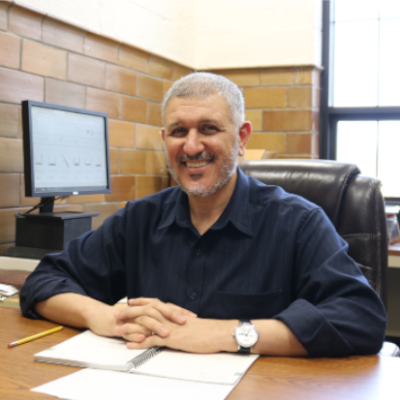Detroit Mercy professor studies metal foam with third Fulbright Program selection
 Detroit Mercy Professor Nihad Dukhan recently completed his third Fulbright Program experience in Turkey, where he and a team of researchers investigated convection heat transfers in metal foam. Metal foam is a solid metal with a large volume of gas-filled pores and has a variety of uses, including in architectural design, automobiles and thermal exchanges.
Detroit Mercy Professor Nihad Dukhan recently completed his third Fulbright Program experience in Turkey, where he and a team of researchers investigated convection heat transfers in metal foam. Metal foam is a solid metal with a large volume of gas-filled pores and has a variety of uses, including in architectural design, automobiles and thermal exchanges.
An international educational exchange program sponsored by the United States government, the Fulbright Program is designed to build connections between the people of the U.S. and other countries. Dukhan, who received a Fulbright Specialist Program award, conducted his project at Istanbul Medeniyet University in late December and early January.
“A Fulbright award is a great honor to have for me personally and for my home institution, Detroit Mercy,” said Dukhan, a professor of Mechanical Engineering in the University’s College of Engineering & Science. “For me, it means more opportunities for research, collaboration and networking. It also means access to scholar and potential graduate students and postdocs.”
Dukhan’s project marks his third Fulbright selection. He was a Fulbright Scholar during the 2014-15 academic year and a Fulbright Specialist during summer 2018. All three of Dukhan’s Fulbright experiences have been to institutions in Istanbul, Turkey.
Dukhan specializes in the science and technology of metal foam, having researched it for nearly 20 years. His project in Turkey investigated new technology through modeling, computer simulation and experiments.
“Pulsating flow will increase the heat transfer and metal foam has a huge surface area, and thus combining the two will form a new cooling technology that can be used in thermal management of high-power devices, such as modern electronic systems and sensors,” Dukhan said. “Preliminary work has shown that, compared to pin fins, the new pulsating-flow-foam cooling technology had more than a 30% average increase in heat transfer.”
Commonly used in modern electronics, pin fins increase heat transfer from heated surfaces to air.
Dukhan hopes his project expands knowledge of pulsating flow heat transfer in metal foam. He plans on publishing the findings in journal articles.
“This project investigates the effect of frequency and amplitude on heat transfer,” Dukhan said. “The investigation will also reveal the combined effect of frequency and amplitude parameters in a new correlation that can be used by researchers and design engineers.”
Since its establishment in 1946, the Fulbright Program has given more than 400,000 students, scholars, teachers, artists and scientists the opportunity to study, teach, conduct research, exchange ideas and contribute to finding solutions to shared international concerns.
Dukhan is one of more than 400 U.S. citizens who share expertise abroad through the Fulbright Specialist Program each year. Recipients are selected on the basis of academic and professional achievement, demonstrated leadership in their field, and their ability to foster long-term cooperation between institutions in the U.S. and abroad. He hopes to invite students and postdocs to the Detroit Mercy to work with him on research projects.
While research is at the forefront of the experience, there are other elements Dukhan relishes.
“I get to visit an amazing city, Istanbul, with its layers of history and cultures, and collaborate with top-notch Turkish scholars,” he said.
Learn more about Detroit Mercy’s College of Engineering & Science.
Learn more about the Fulbright Program.
— By Ricky Lindsay. Follow Detroit Mercy on Facebook, Twitter and Instagram. Have a story idea? Let us know by submitting your idea.
